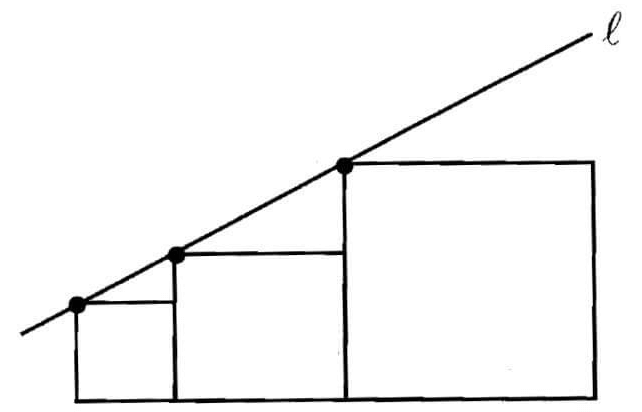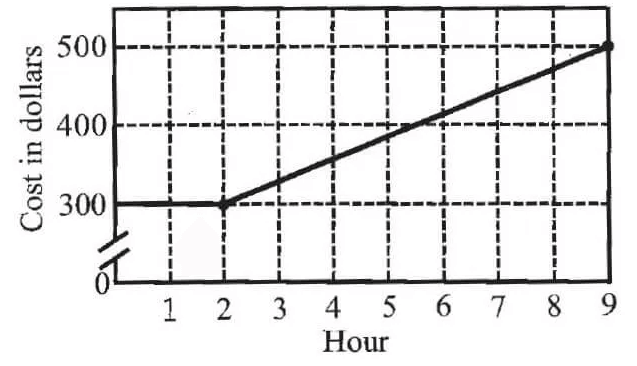SOLVING WORD PROBLEMS TRIGONOMETRY
Problem 1 :
A bird is sitting on the top of a 80 m high tree. From a point on the ground, the angle of elevation of the bird is 45° . The bird flies away horizontally in such away that it remained at a constant height from the ground. After 2 seconds, the angle of elevation of the bird from the same point is 30° . Determine the speed at which the bird flies.(√3 = 1.732)
Solution :
Let "x" be the speed at which the bird flies.
Time = distance / speed
2 = distance / x
Distance covered = 2x
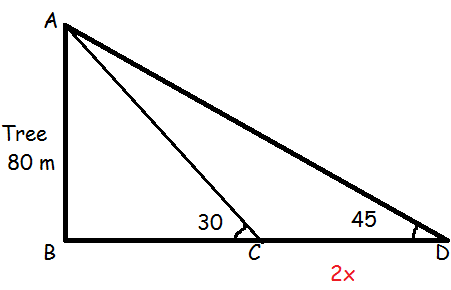
In triangle ABC,
tan θ = Opposite side / Adjacent side
tan 30 = AB / BC
1/√3 = 80/ BC
BC = 80√3 ----(1)
tan 45 = AB / CD
1 = 80/(BC + CD)
1 = 80/(BC + 2x)
BC + 2x = 80
BC = 80 - 2x ------(2)
(1) = (2)
80√3 = 80 - 2x
By dividing the entire equation by 2, we get
40√3 = 40 - x
x = 40 - 40√3
x = 40(1 - 1.732)
x = 40 (-0.732)
x = -29.28
Because, the speed can not be negative, speed of the bird is 29.28 m/s
Problem 2 :
An aeroplane is flying parallel to the Earth’s surface at a speed of 175 m/sec and at a height of 600 m. The angle of elevation of the aeroplane from a point on the Earth’s surface is 37° at a given point. After what period of time does the angle of elevation increase to 53° ? (tan 53° = 1.3270, tan 37° = 0.7536)
Solution :
Let "x" be the required time.
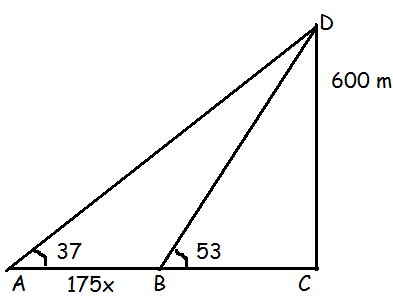
In triangle DBC,
tan 53 = DC/BC
1.3270 = 600/BC
BC = 600/1.320 ----(1)
In triangle ADC,
tan 37 = DC/AC
0.7536 = 600/(175x + BC)
175x + BC = 600/0.7536
BC = (600/0.7536) - 175x----(2)
(1) = (2)
600/1.3270 = (600/0.7536) - 175x
175x = (600/0.7536) - (600/1.3270)
175x = 600(1/0.7536 - 1/1.3270)
175x = 600(1.32 - 0.75)
175x = 600(0.57)
175x = 342
x = 342/175
x ≈ 1.95 seconds
Problem 3 :
A bird is flying from A towards B at an angle of 35° , a point 30 km away from A. At B it changes its course of flight and heads towards C on a bearing of 48° and distance 32 km away.
(i) How far is B to the North of A?
(ii) How far is B to the West of A?
(iii) How far is C to the North of B?
(iv) How far is C to the East of B?
(sin 55° = 0.8192, cos 55° = 0.5736, sin 42° = 0.6691, cos 42° = 0.7431)
Solution :
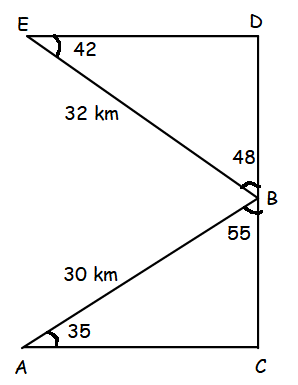
(i) To find how far is B to the North of A, we should find the length of AC.
sin θ = Opposite side/hypotenuse
cos θ = Adjacent side/hypotenuse
sin 55 = AC/30
0.8192 = AC/30
AC = 0.8192(30)
AC = 24.58 km
(ii) To find how far is B to the west of A, we should find the length of BC.
cos 55 = BC/30
0.5736 = BC/30
BC = 0.5736(30)
BC = 17.21 km
(iii) To find how far is C to the north of B, we should find the value of BD.
sin 42 = BD/32
0.6691 = BD/32
BD = 0.6691(32)
BD = 21.41
(iv) To find how far is C to the east of B, we should find the length of DE.
cos 42 = DE/32
0.7341 = DE/32
DE = 0.7341(32)
DE = 23.49 km
Kindly mail your feedback to v4formath@gmail.com
We always appreciate your feedback.
©All rights reserved. onlinemath4all.com
Recent Articles
-
Digital SAT Math Problems and Solutions (Part - 146)
Apr 18, 25 06:52 AM
Digital SAT Math Problems and Solutions (Part - 146) -
Logarithmic Derivative Problems and Solutions
Apr 16, 25 09:25 PM
Logarithmic Derivative Problems and Solutions -
Digital SAT Math Problems and Solutions (Part - 145)
Apr 16, 25 12:35 PM
Digital SAT Math Problems and Solutions (Part - 145)
